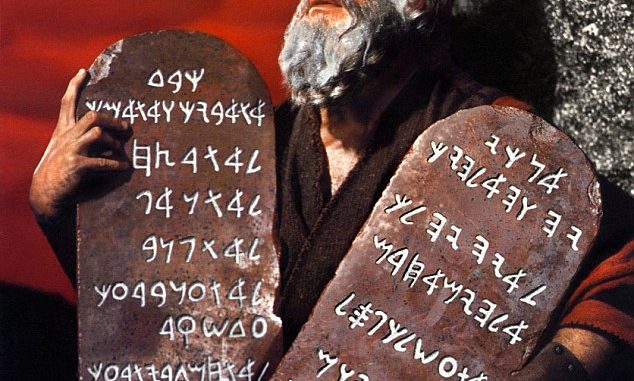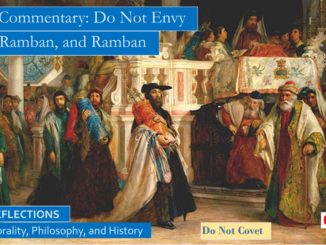
We find a perfect ten reasons not to dance as we review the Decalogue.
In this chapter we consult a certain non-rabbinical source, and find a perfect ten reasons not to dance.
The Decalogue is symmetrical. The commandments to Love G_d with all of your heart and with all of your soul and with all of your possessions are mirrored in the commandments to love your neighbor as yourself. If you steal, murder, or adulter today, yesterday you coveted that which was not yours and could never properly be yours. Coveting is wanting. Coveting is looking. Looking, if not sinful, and it is sinful, is inviting sin to cross under our doorposts.
NOTE: This series of blogs are an unpublished book by my guest columnist, Jonah, 160 Reasons Not To Dance with the Other Woman at your Son’s Bar Mitzvah.
Prior blog: The Decalogue in the Torah, Blog 1, We are Invited to a Curious Bar Mitzvah
http://www.seekingvirtueandwisdom.com/the-decalogue-in-the-torah-blog-1-we-are-invited-to-a-curious-bar-mitzvah/
Bridging the commands to Love G_d with all our heart and with all of our soul and with all of our mind and the commands to love our neighbor as ourselves is the Mitzvoth to honor our parents. This Commandment to honor your father and your mother bridges the positive Mitzvah on G_d’s tablet and the negative Mitzvah on man’s tablet. Ramban teaches, “Honor thy father is for the glory of G_d, since it is for the glory of the Creator that He commanded that one honor one’s father who is a partner in the formation of the child.” To honor and respect your father and your mother is a positive exhortation like the urging to Love G_d with all your heart and with all your soul and with all your all. It is a command aimed at the parents as well as the children. Children, especially little children, see their parents as little gods. Implicit in this command is that parents should be worthy of respect, that they should respect G_d and respect the Mitzvoth of the Torah, and set a good example for their children.
To start counting the reasons why the other woman should not be allowed to dance at our son’s Bar Mitzvah, let us first take a broad brush look at the Decalogue, those core teachings written by the finger of G_d and brought down the smoking mountain in those distant days in the desert. We will not delve deep into the rabbinical materials just yet because each of the Ten Commandments are also in the 613 Mitzvoth.
The story of David with Bathsheba reveals that when you adulter you break many other commandments simultaneously. David covets, David adulters, David steals, David murders, David lies and lies again. When we count must how many Mitzvoth our dear dancers transgressed, we can take some inspiration from a particular non-rabbinical source: Bo Derek, the perfect “10.” Truly, Ms. Derek is an inspiration for the other woman. Not only is she knock-dead gorgeous in her fishnet, but in the movie “10,” not only did her character adulter, she adultered on her honeymoon.
We know that Ms. Derek, and many of the other women, like to work on their looks and their bounces and their jiggles, all in search of the perfect score of “10,” so we should oblige them. Keep in mind we are not looking to hate the other woman either today or even tomorrow, we just do not want her to dance at our son’s Bar Mitzvah, we would rather that she would stay home just this one day. This is the perfect ridge on which to take a moral stand, being just a little judgmental is okay for today.
We will start with the trio:
You shall not murder,
You shall not adulter,
You shall not steal.
In the Hebrew each of these verbs is one word. Some literal translations coin the usage “adulter” because to translate the commandment as “You shall not commit adultery” breaks the cadence of the text. The reader loses sight that these commandments flow into one another.[1]
Adultery is a quagmire. The cruelty of adultery, especially when children are involved, is the concept that relationships are disposable. Like your spouse used to be a bright and shiny shoe, but how they are an old shoe, and should be thrown away. Why fix old shoes? But if you buy new shoes, they’ll get old too someday. The problem with the other woman, is if you want to go back to your wife, if she’ll have you, is you have to dispose of her first. You just can’t wear two pairs of shoes.
Adultery is certainly stealing someone’s husband, stealing his affections, and stealing his time. Since the family never has as much money coming in, adultery steals his money from his children and his wife as well.
Adultery is also a form of murder. Adultery is a form of murder because it means that you do not care for your spouse, that you regard them as disposable. It is murder because each spouse often seeks to hurt the other any way they can. If you do not think adultery is not murder, ask a divorce attorney how many of their clients have committed suicide the past few years.
The other negative command is translated in one source as:
You shall not testify against your neighbor as a lying witness.
Of course, in adultery there is a great deal of deceit and lying and sneaking around, but is not what this commandment is about. This commandment is actually warning against a special type of murder. For both parties in a divorce this should be interpreted as not murdering the good name and reputation of your spouse (or whatever is left of it). The adulterer always drags his spouse through the mud, and if they still look good after the mudding, they just simply accuse them of being mentally ill or emotionally abusive. Destroying the reputation of your spouse when speaking to your children may be as great a sin as the adultery itself.
The Decalogue begins with long commandments, and ends with long commandments, the commandments against coveting:
Do not covet your neighbor’s wife.
And do not covet your neighbor’s house,
his field, or his male slave,
or his female slave, his ox or his donkey,
or anything else that is your neighbor’s. (Deuteronomy 5:18)
If you think about it, how can you not covet? Perhaps you should never proudly lead your friends through the house you are so proud of, lest you tempt them to covet. Maybe you shouldn’t buy new cars lest you provoke your neighbors to jealousy. When you are at the beach, and your husband is sitting next to you, behind his sunglasses, should he be looking at the other women? Is that coveting? Perhaps you should never go to the beach, lest one of you are tempted to covet. Not coveting is tough. How far must we go? We need to study the rabbis on this question.
To put it simply, when G_d says you should not covet, He is saying you should never desire to possess that which is not yours. Especially you should never lust after that which should never be yours.
So far we have a perfect sweep of the “You shall not hate your neighbor” commandments, so maybe a perfect “10” is within our reach. We reach the commandment which, if it is not on the sins against G_d tablet, it is certainly a bridge between the sins against G_d and the sins against man:
Honor your father and your mother,
in the way Adonoy, your G_d, commanded you;
in order that you may live long
in order that you may have it good on the land
that Adonoy, your G_d, is giving you. (Deuteronomy 5:16)
This commandment was broken that night on many levels. First, the husband was certainly not respecting the parents of his wife. I cannot imagine what it must be like to confront my wife’s parents dancing with the other woman in my arms. How is this possible? Isn’t this why G_d invented leprosy?
Second, the husband certainly does not respect his parents, they should have brought him up to do better. After all, they are damned to sit at the pariah table with the other woman. At least if he had left her home he would feel rejected and leave early. Then his parents could mingle with the others in the room.
Thirdly, and most importantly, when the father danced with the other woman in front of his son, right in front of his son at his Bar Mitzvah, he is making it very difficult for his son to respect him. His son is having behavior problems at school, like many children of divorced parents.
This too is a form of murder. Another divorced lady told me a story of her six year-old shortly after her divorce. This backsliding Jewish girl was at a Cub Scout Conference, trolling for men, and she caught this lady’s husband. After the split-up she was destitute, had to move back in with her parents for a while. The family life was shattered. Her six year-old son was coloring slashes of black and bright red over a stick figure, she asked what he was doing. His answer: “I wish my dad were dead.”
So we have this coveter, this slanderer, this murderer, this adulterer, this robber, who also doesn’t respect his or her parents, who is dancing with his other woman at his son’s Bar Mitzvah, and on what day is he doing this? All Bar Mitzvahs are held on the Sabbath, the day to be made holy. It is an important command to G_d, because the command is quite lengthy:
Preserve the day of Sabbath to sanctify it,
as Adonoy, your G_d, commanded you.
Six days you will work
and perform all your labor,
but the seventh day,
Sabbath for Adonoy, your G_d,
do not perform any labor-
you, your son and your daughter,
your male slave and your female slave,
your ox and your donkey and all your animals,
and the non-Jew who dwells in your cities-
in order that your male slave will rest
– and your female slave – like you..
Remember that you were a slave
in the land of Egypt,
and Adonoy, your G_d, took you out of there
with a strong hand and an extended arm.
That is why Adonoy, your G_d, commanded you
to celebrate the Sabbath day. (Deuteronomy 5:13-15)
He loves this other woman more than his wife, more than his parents, more than his wife’s parents, more than his son, and also more than his G_d. This too is a form of murder, because by making it difficult for his son to love him, he is also making it difficult for his son to Love G_d. This is the longest commandment of all, and contains the chilling reminder that G_d visits the crimes of the parents onto the second and third and fourth generations of those who hate Him. The hatreds dredged up through adultery stain even the unborn.
So we have one commandment to go. “You shall not take the name of the Adonoy your G_d in vain.” My argument would be that dancing with the other woman at your son’s Bar Mitzvah is mocking G_d, mocking his commandments, mocking the Mitzvoth in the Torah.
So we have the perfect “10”, all commandments have been broken, and what should have been a perfectly joyous day is mixed in with black slips and black hair and blackened souls. May G_d have mercy on us all.
Divorce murders the soul of the spouse left behind. She is bitter and angry and resentful, sometimes to the end of her days. It will be harder for her to Love G_d. We must mine the Mitzvah so she is not drug into sin by her bitterness.
How can we truly Love G_d? With our sins, and the sins of our fathers, and the sins of our grandfathers, and the sins of our great-grandfathers being visited upon us, how can we possibly Love G_d? Too many people feel Loving G_d is those warm and fuzzies you get when you go to Temple and light candles and gorge at holiday meals. But how can we Love G_d if we do not love each other? Loving G_d is much simpler if we love each other, but quite difficult and impossible if we despise each other. Since we are discussing whether we should let the other woman dance, perhaps we should discuss the relevant Mitzvah as they relate to the Decalogue in reverse order. That way we can learn to love each other first before we attempt to discuss Loving G_d. And when we are talking about the other woman, the Mitzvah against coveting is a good start.[2]
Next blog: The Decalogue in the Torah, Blog 3: Does the Torah Condone Divorce?
http://www.seekingvirtueandwisdom.com/the-decalogue-in-the-torah-blog-3-does-the-torah-condone-divorce/
[1] Gary Rendsburg, “The Book of Genesis,” lectures recorded by The Great Courses, (www.thegreatcourses.com , 2006)
[2] For those works cited that are organized by either Mitzvah or by verses, page references are unnecessary.
All Scripture quotations are from the Metsudah Chumash.
The Metsudah Chumash/Rashi, Five Volume Set, translated and/or annotated by Avrohom Davis, Hachum Kornfeld, and Abraham Walzer, (New York, Metsuda Publications, 1999-2002),
Rambam Maimonides, The Commandments, translated by Rabbi C Chavel, Volume One, Positive Commandments, Volume Two, Negative Commandments (New York: The Soncino Press, 1967)
Ramban Nachmanides, Commentary on the Torah, Five Volume Set, translated and annotated by Rabbi C Chavel (New York: Shilo Publishing House, 1976)
Ronald Eisenberg, The 613 Mitzvot, A Contemporary Guide to the Commandments of Judaism (Rockville, MD: Schreiber Publishing, 2005)
Richard Elliott Friedman, Commentary on the Torah (New York: Harper Collins, 2001)




2 Trackbacks / Pingbacks